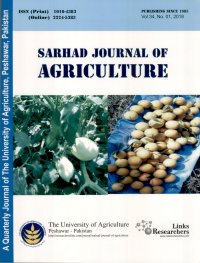Response of Spring Wheat (Triticum aestivum L.) to Induced Water Stress at Critical Growth Stages
Response of Spring Wheat (Triticum aestivum L.) to Induced Water Stress at Critical Growth Stages
Muhammad Mudassar Maqbool1, Anser Ali1, 2 *, Tanveer ul Haq1, Muhammad Nasir Majeed1, Dong Jin Lee2
ABSTRACT
The extent of yield reduction with water deficit depends not only on the magnitude of water deficit but also on the stage of plant growth at which it develops. A pot study was conducted during 2011-12 at College of Agriculture, Dera Ghazi Khan, to assess the effect of induced water stress on performance of different wheat varieties at critical growth stages. Three wheat varieties viz. Faisalabad-2008, Lasani-2008 and Kohistan-97 were manually sown in polythene lined pots. Five water stress treatments were created by withholding the irrigation for specified time at critical growth stages viz. tillering, booting, anthesis and milking (grain filling), whereas a well-watered treatment was also included during whole plant growth and development period. The results showed that water stress significantly reduced plant height, number of total tillers per plant, number of fertile tillers per plant, number of nodes per plant, spikelet per spike, number of grains per spike, 100-grain weight and dry matter per plant as compared with control. Wheat genotype Faisal-2008 exhibited comparatively more drought tolerance with less decrease in growth rate (18.70%); total dry matter (26.94%), 100-grain weight (23.45%) and grain yield (21.50%) as compared with all other treatments. It was concluded that water stress induced at grain filling stage showed a significant impact on wheat growth as compared with other growth stage stresses. Regarding genotypes, Faisal-2008 was least affected by water stress than other varieties.
To share on other social networks, click on any share button. What are these?







